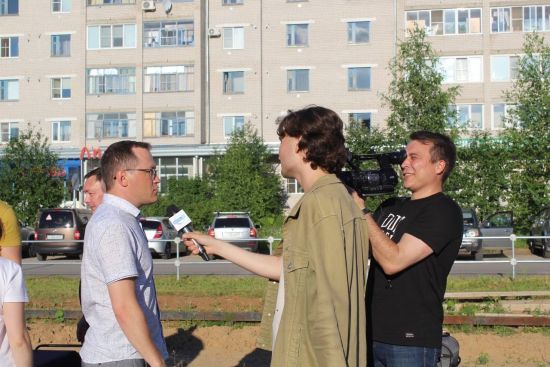SPbU revives offsite trainings for journalism students
August 19, 2022
The Clinic of Communication Projects at St Petersburg University has launched the most expected project of this summer — an offsite summer practical training in the Russian North. Ten students from Russia’s oldest university went to get journalistic and PR experience in the Arkhangelsk region. During training, they will prepare materials for print media, television companies and press services of the region.
Students undergo practice in 3 cities: Arkhangelsk, the capital of the Arctic, Kotlas and Velsk, important industrial centres. SPbU offered students to work in editorial offices of socio-political and regional newspapers, a regional image magazine, television, as well as press centres of the municipal administrations. The practical training is organised with the support of the Representative Office of the Arkhangelsk Region in St Petersburg.
In total 27 bachelor and master degree students of "Journalism", "International Journalism", "Advertising and Public Relations" programmes submitted applications for participation in the practical training. According to Director of the Clinic of Communication Projects, Associate Professor of St Petersburg University Ekaterina Sharkova, the organisers did not expect that the pilot project, which requires courage from participants, would be so popular. ‘Surprisingly, not all participants of the practical training are born in the Arkhangelsk region. Many of them are residents of St Petersburg. Their sincere desire to immerse themselves in the richest historical and cultural potential of the Russian North and interest in interacting with professionals in regional journalism is more valuable in this context’, she noted.
The Clinic of Communication Projects at St Petersburg University (former training and educational press centre of the Higher School of Journalism and Mass Communications Institute) has been cooperating with the Representative Office of the Arkhangelsk Region in St Petersburg since 2018. Since then university’s representatives participated in various projects aimed at promoting regional image and were awarded with certificates and medals of the Governor of the Arkhangelsk region. The largest projects they participated in are: Lomonosov Assembly; Archangel Mikhail’s Archangelsk — Lomonosov’s motherland; series of events dedicated to 100th anniversary of Fyodor Abramov’s birth.
Following competitive selection of documents (including motivation letter), 10 students have been successfully approved for participation in the training. An interview conducted in the process of selection made it possible to assess professional qualification of the students and select the most suitable positions and mentors among editors-in-chief and heads of press services for them. ‘I saw a great opportunity to have unusual experience in this offsite training. I decided not to stay in St Petersburg in the very hot weather and go to the North. I’m really interested in these places, its history and climate’, said Anton Artemov, a first-year «Journalism» programme student from St Petersburg.
I really hope that students not only will discover the marvellous Russian region, meet talented journalists, who are becoming more difficult to find, but also will write a brand new chapter of the journalism profession, which helps us to save our history.
Alla Valuyskikh, Deputy Head of the Representative Office of the Arkhangelsk Region in St Petersburg
Presently, many people from the Arkhangelsk region work at St Petersburg University, Baltic State Technical University, the Admiral Makarov State University of Maritime and Inland Shipping. Joint events and projects conducted by these universities and the Representative Office of the Arkhangelsk Region in St Petersburg help to develop the Arctic region cooperation. Alla Valuyskikh, supervisor of the University’s offsite training, Deputy Head of the Representative Office of the Arkhangelsk Region in St Petersburg, graduate of the Journalism Faculty of Leningrad State University, has extensive experience in regional journalism and PR in the public sector. Formerly, she worked as a teacher at the Journalism faculty of Northern (Arctic) Federal University. According to Alla Valuyskikh, offsite training was very successful half a century ago: engineering universities’ graduates went to work in Severodvinsk, and ideological framework of Arkhangelsk mass media was built by graduates of Leningrad State University.
‘Arkhangelsk region maintained friendly relations with Journalism faculty of Leningrad State University. Every summer students came for practical training in the media of the region. As a result, the editorial offices were staffed by graduates of the St Petersburg’s Journalism faculty. For more than 30 years, there were no practical trainings. Glad to see things have changed this summer. Troop of university students who are to be future journalists went to Velsk, Kotlas and Arkhangelsk for the practical training’, noted Alla Valuyskikh.
The Arkhangelsk region is the birthplace of the great Russian scientist and thinker Mikhail Lomonosov, the writer Fyodor Abramov, the astronaut, Hero of the Russian Federation Ivan Vagner, Admiral of the USSR Fleet Nikolai Kuznetsov, the place of exile of the academician Dmitry Likhachev and the poet Joseph Brodsky. Ivan the Terrible founded Arkhangelsk in 1584. In 1693, the first Russian port was constructed in the city on the Dvina River by order of Peter I. Cultural and historical heritage of the Arkhangelsk region is inestimable: it plays a central role in shaping the image of the "Russian North". There are more than 1900 unique historical and cultural monuments on the territory of the region, including the Solovetsky Monastery, Malye Korely, Kenozersky National Park, etc. Culture of the North has always been associated with spiritual unity, continuity of centuries-old traditions in conducting of rituals, fishing activities. The distinct national character was shaped over centuries. It was influenced by the need to adapt to harsh life conditions and absence of serfdom in the North.
No comments yet. Be the first!



